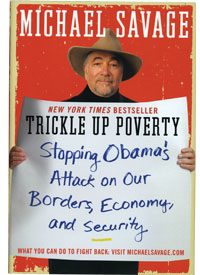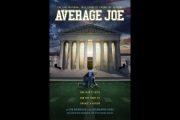
As I was listening to Michael Savage’s radio show no more than a year ago, I heard something that might have caused his faithful listeners to scurry for the anti-depressants. (That is, if the host weren’t so steadfast in counseling against their use.) Dejected over his unfair inclusion on a list of individuals banned from travel to Britain, Savage expressed an intention to leave the airwaves in the not-too-distant future. Since then, however, certain events have changed his mind. Not the least of these, I believe, is his desire to fight the good fight against the statist advance under the Obama administration. And the result of this patriotic motivation is his latest book Trickle Up Poverty (TUP).
While TUP is Dr. Savage’s latest book, it is no more the first than radio is his first career. The many-hatted host — who holds a doctorate in epidemiology and nutritional science — actually spent a good part of his life as a botanical Indiana Jones, traveling the South Pacific in search of plants with medicinal qualities. Considered a pioneer in the field, he wrote 17 books on health and herbal medicine and, upon transitioning to nutrition for the mind, wrote numerous best-sellers on politics and social issues.
Despite these years spent fighting the culture war, however, Savage did not draw solely from his own store of knowledge when writing TUP. Rather, he mentioned on air that he consulted with various experts while crafting certain segments (such as the one on finance, I believe), in an effort to ferret out the truth on what ails us as a nation. And the result is a nutrient-dense work, one from which even the most studied political wonk will learn.
As you might expect, Savage neither feigns impartiality nor hides his passions, and he doesn’t claim his book is for everyone. He states in the author’s note that it was written for Americans who voted against Barack Obama and those who supported him but now have buyer’s remorse. This is reflected in much of the author’s note, by the way, whose prose smacks of his bold radio-style delivery (did you expect dry academic parlance?). Thus, if any dyed-in-the-wool liberals do read TUP, they may want to skip to chapter one to avoid a psychotherapy-cost-increasing short circuit.
After the author’s note, Savage transitions into a more cerebral, but still conversational, presentation. As is his wont, he often introduces a subject with a personal anecdote that taught him a life lesson. And while President Obama and his policies are the book’s primary focus, it’s no partisan screed. The iconoclastic Savage has never been a party man, and while rendering more criticism where it is due, he spares neither the Republicans nor Obama’s predecessor, George W. Bush.
In the opening chapter, Savage speaks of how Americans are angry and a revolution is brewing in the nation, as epitomized by the Tea Party. He then examines Obama’s radical past in a chapter that struck me as much as any in the book. Savage peels away layer after layer of the president’s personal history, revealing a portrait of a man fed Marxism with his mother’s milk. Savage also coins a new term, characterizing Obama and his liberal-elite fellow travelers as “pan-Leninists”; in other words, men with an ideology — and without a country.
Now, some Americans will think that thus characterizing the President smacks of hyperbole, but I would caution against dismissing it as such. We now know that Savage’s assertion is vindicated by a man named John Drew — an ex-communist and acquaintance of Obama’s at Occidental College — who stated that then-student Obama was “in 100 percent, total agreement” with his communist professors and was a flat-out “Marxist-Leninist” who advocated old-style communist revolution. Savage explores this radical past in detail, marshaling irrefutable facts. If you’re a member of the ostrich brigade, read it if you want your eyes opened; if you already possess eagle’s eyes, read it if you want them opened wider. Whatever the case, though, this chapter alone makes TUP worth the read.
After exploring Obama’s past, Savage offers a crash course in Marxism-Leninism. Among other things, he points out that Karl Marx was an unproductive citizen before big-government programs made such status fashionable. Marx washed as little as he worked, liked getting drunk, and, when his irresponsibility led to his one-year-old son Guido’s death, rationalized that the boy was “a sacrifice to bourgeois misery.” But it was more like a preview of communist misery, Savage makes clear, in his overview of communist folly.
Savage also dissects the financial crisis, discussing matters from the short-selling devastation wrought by the “uptick” rule’s elimination to the globalist machinations of shadowy entities such as the Bilderberg Group. He discusses widely unpopular ObamaCare and explains how it creates a “Ready Reserve Corps” — which is intended “for service in time of national emergency” and is appointed by the President — and theorizes that it might be “the first step” in the establishment of Obama’s much criticized private national security force. He delves into the global-warming agenda and points out that “public nuisance” laws are already being used to “extract hefty fines from those they [the warmists] think are responsible, on some level, for global warming.” Savage sounds the alarm about the subversive activities of groups such as La Raza (“The Race” in English) and MEChA, and he points out that Obama has already appointed a member of the former to one of the highest offices in the land. He exposes Obama’s ties with radical, vote-fraudster groups such as ACORN and the anti-American, anti-white Nation of Islam. He discusses schools’ role in peddling propaganda and how Obama’s nationalization of the student-loan industry made the Department of Education one of America’s largest banks. And he discusses how Obama has been neutering and endangering our military, explaining why there have been more 2009-2010 troop deaths in Afghanistan than during all of George Bush’s two terms in office. The reason? Obama has instituted lawyer-disgorged rules of engagement that Savage characterizes as “Ready, aim, hold your fire.” They just have to be read to be believed. Of course, the preceding is merely a small sampling of a pathology ailing America that TUP lays out in great detail.
Dr. Savage doesn’t content himself, however, with rendering a diagnosis; he also prescribes cures. He begins by fully endorsing the Tea Party’s 10-point “Contract From America” and then expands upon it with his own 37-point plan. Ranging from making English the official language of the states and defending the borders to using profiling to end terrorist attacks and imposing tariffs on China, most Americans will support the majority of its elements. Insofar as this goes, Savage could be called a populist, but he hasn’t earned that status by seeking popularity. Rather, he can thus be described because he possesses a commodity uncommon in politicians but extant among the common man: common sense.
Of course, common or not, some readers may disagree with a few points. Constitutionalists might mention that things such as making English the official language and instituting health savings accounts would, under the Constitution, have to be done on the state level. Some may say that Savage’s belief (if I read him correctly) that this is the 11th hour for our nation is overly pessimistic, while others may say it’s more like 10 to midnight. Whatever the case, however, most traditional Americans will agree that if the ideas in Trickle Up Poverty trickled up to our government, we could at least start to approach a new dawn.
Trickle Up Poverty: Stopping Obama’s Attack on Our Borders, Economy, and Security, by Michael Savage, New York: HarperCollins Publishers, 2010, 365 pages, hardcover, $26.99.



